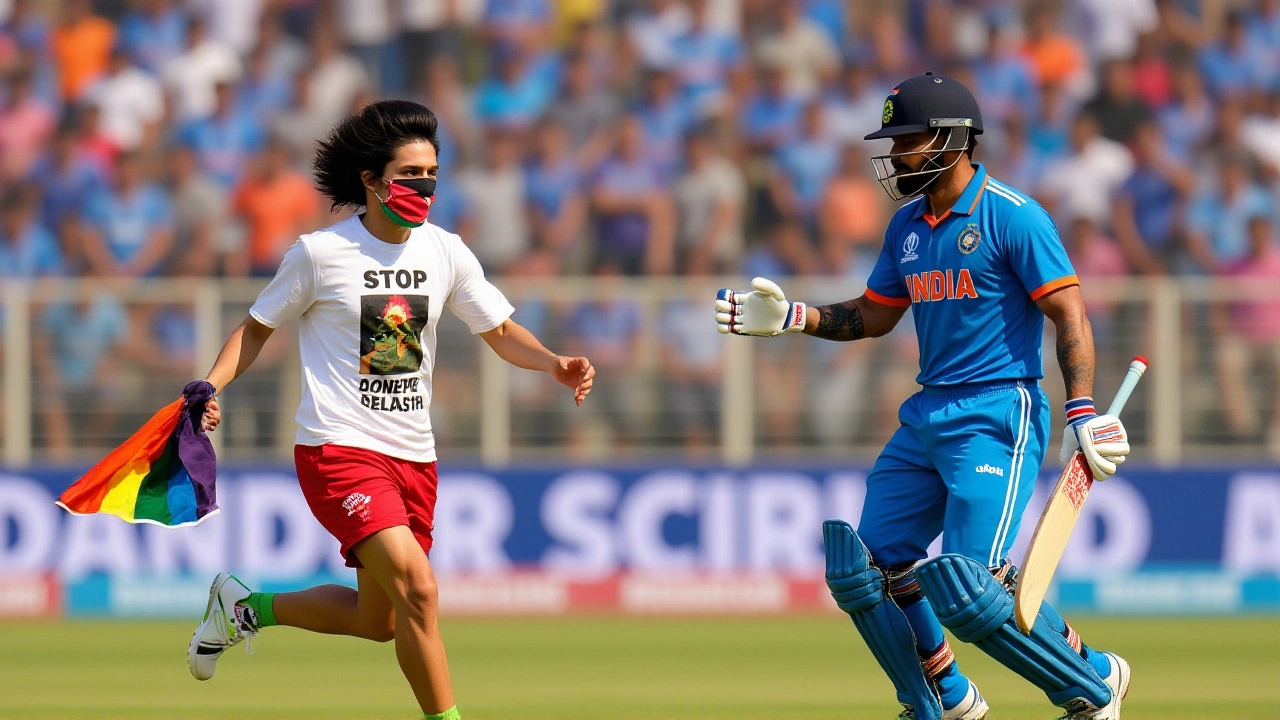When Johnson Wen sprinted onto the Melbourne Cricket Ground during the 97th over of the Border-Gavaskar Trophy on December 27, 2024, he didn’t just disrupt a cricket match—he reignited a global conversation about fame, protest, and the crumbling lines between sport and social media spectacle. The 24-year-old Australian, known online as "Pyjama Man," was apprehended by security after running onto the field wearing a blue Indian jersey and a white t-shirt with "Free" scrawled across the Ukrainian flag. It was his third major pitch invasion in under two years—and the second time he’d targeted an India-Australia match.
The Pattern of a Serial Invader
Johnson Wen’s path to notoriety isn’t random. It’s calculated. On November 19, 2023, during the ICC Men’s World Cup final at the Narendra Modi Stadium in Ahmedabad, he charged onto the pitch wearing a "Free Palestine" shirt beneath his Indian jersey, slipped past security, and briefly embraced Virat Kohli before being dragged away. Police later confirmed he pushed two officers during the breach. He told investigators he’d come "to meet Virat Kohli," adding, "I’m a big fan." But investigators saw something else: a man using global crises as props for viral content.His pattern stretches beyond cricket. On August 20, 2023, during the FIFA Women’s World Cup Final at Sydney’s Stadium Australia, he sprinted onto the field wearing a "Free Ukraine" shirt with "stop Putler" printed on the front. The match paused for nearly three minutes. And in 2020, he was fined AU$200 after performing the "floss" dance on the field during a rugby league match at Brisbane’s Suncorp Stadium. Then, on June 9, 2025, he climbed onto the stage during Katy Perry’s "The Lifetimes" tour at Accor Stadium in Sydney—his most audacious stunt yet.
Security Failures and Public Outrage
The MCG incident raised alarms. How did a known repeat offender—already flagged by Indian police, Australian authorities, and global media—gain access to one of the world’s most secure sporting venues? The Melbourne Cricket Club has not publicly commented, but insiders told the Australian Financial Review that Wen’s name was in a "limited watchlist" but not flagged for real-time alerts. His ticket, purchased under a different name, bypassed facial recognition systems."This isn’t just trespassing," said Dr. Lena Rourke, a security analyst at Monash University. "It’s a systemic failure. These aren’t lone actors. They’re part of a growing subculture that treats stadiums like TikTok backdrops. The institutions aren’t adapting fast enough." The Victoria Police charged Wen under the Major Sporting Events Act 67(2) and trespass, releasing him on bail with a court date of March 3, 2025. In India, he faced charges under IPC sections 332 (hurting a public servant) and 447 (criminal trespass) after the 2023 World Cup breach.

Who Is Johnson Wen?
Born in Sydney to a Chinese father and Filipino mother, Wen works as a sales associate for a solar panel firm. He lives modestly. His social media accounts—primarily TikTok and Instagram—show a mix of travel vlogs, protest art, and chaotic stadium footage. His followers have grown from 8,000 in early 2023 to over 1.2 million after the World Cup incident. One post after the MCG breach read: "Ran up to Virat Kohli at the Boxing Day Cricket 2024. I said to him, ‘Hey Virat, do you remember me? I ran to you at the 2023 World Cup final.’ He was cool with me and laughed."But Kohli’s team denied any interaction. "There was no conversation," said an Indian team spokesperson. "He was removed immediately. Virat was focused on the game." The discrepancy speaks volumes: Wen believes he’s creating a connection. The athletes see a threat.
Why This Matters
This isn’t about one man. It’s about a generation raised on attention economics. Where once protesters held signs, now they run onto fields. Where once activists spoke at rallies, now they hijack global broadcasts. The Gujarat Cricket Association called the 2023 breach "unprecedented"—but it’s becoming routine. The ICC has yet to issue a formal stance, though sources say internal discussions are underway about banning known offenders from all member nations’ grounds.And here’s the twist: Wen isn’t alone. Daniel Jarvis, another serial invader, breached the Chepauk Stadium in Chennai during the same series, wearing an Indian jersey to protest caste discrimination. Two men. Two causes. One shared playbook: chaos as content.

What’s Next?
Wen’s next court date—March 3, 2025—is likely to be a turning point. If convicted, he could face fines, community service, or even a ban from stadiums nationwide. But his legal troubles may only fuel his online brand. His followers are already calling him a "modern-day Robin Hood of attention."Meanwhile, sporting bodies are scrambling. The MCG is reportedly upgrading its AI surveillance system. Cricket Australia has hinted at a new "fan conduct charter." And the ICC may soon introduce a global database of banned individuals—a move that could set a precedent for other sports.
For now, Johnson Wen remains free. He’s still posting. Still planning. Still chasing the next moment that will break the internet.
Frequently Asked Questions
Why does Johnson Wen target cricket matches specifically?
Cricket matches, especially India-Australia games, draw massive global audiences—over 500 million viewers for the 2023 World Cup final. Wen knows these events guarantee maximum exposure. His social media analytics show a 400% spike in engagement after cricket invasions compared to other sports, making them his preferred stage for viral growth.
Has Johnson Wen ever been arrested outside Australia and India?
No, but he’s been detained in multiple countries. After the 2023 FIFA Women’s World Cup incident, Australian authorities issued a warning but didn’t press charges due to lack of injury or property damage. In 2024, he attempted to invade a rugby match in New Zealand but was stopped at the gate. His name is now flagged in INTERPOL’s unofficial crowd-control alert network.
What’s the legal penalty for pitch invasions in Australia?
Under the Major Sporting Events Act 67(2), penalties include fines up to AU$10,000, up to 12 months in jail, or both. First-time offenders often receive fines and bans, but repeat offenders like Wen face stricter sentences. In 2023, a similar case in Sydney resulted in a 6-month stadium ban and 80 hours of community service.
Why didn’t security stop him at the MCG if he’s a known offender?
Wen used a different name to purchase his ticket, and his photo wasn’t in the MCG’s real-time facial recognition database. While Indian police shared his details after the 2023 breach, Australia’s system didn’t integrate international watchlists. The MCG’s security review, released in January 2025, admitted the gap and pledged to sync with global databases by June 2025.
Are other athletes reacting to these invasions?
Yes. Virat Kohli’s team now conducts pre-match briefings on how to handle uninvited guests. Australian captain Pat Cummins said, "We’re trained to keep focus, but it’s unnerving when someone you’ve never met tries to hug you mid-over." Several cricketers have called for stricter bans. The ICC is considering mandatory background checks for all spectators at major finals.
Is Johnson Wen’s activism genuine, or is it just for views?
It’s hard to say. He’s worn pro-Palestine, pro-Ukraine, and anti-racism shirts—but never participated in protests outside stadiums. His content lacks depth on the issues he claims to support. Experts believe he’s exploiting causes as branding tools. As one criminologist put it: "He’s not a protestor. He’s a performer. The cause is just the costume."
